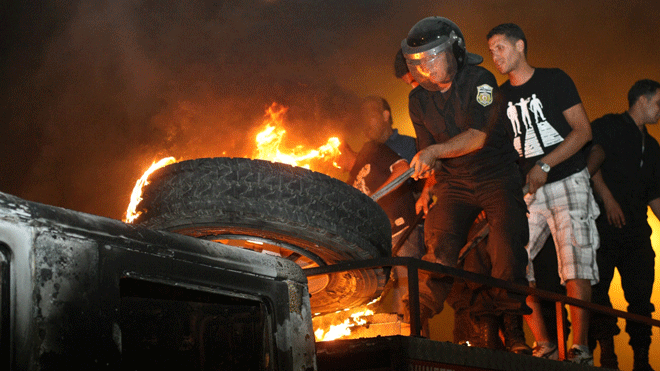
June 12, 2012: A Tunisian firefighter tries to extinguish a burning tyre on top of a truck after it was set on fire by radical Islamists protesters during overnight riots in Sijoumi near Tunis. (AP)
TUNIS, Tunisia – Calm returned to Tunisia on Wednesday after days of riots by radical Islamists across the country left 62 members of the security forces injured and led to 162 arrests.
Ultraconservative Islamists known as Salafists attacked an art gallery Sunday for an exhibition they said insulted Islam. After security forces dispersed them with tear gas, gangs attacked police stations around the country.
The country is bracing for renewed unrest on the Muslim holy day of Friday when a number of conservative religious groups have called for renewed demonstrations against insults to the faith.
Tunisia for half a century was ruled by a secular dictatorship that fiercely repressed any Islamist sentiment and since the overthrow of the regime last year, there has been a spread of religious groups.
A moderate Islamist party, Ennahda, won elections and allied itself with two secular parties, but hardline groups say the government is not doing enough to implement Islamic law.
There have been a rising number of clashes between secular groups and religious hardliners in recent months, but this week's violence is unprecedented and comes just two days after Al Qaeda issued a statement calling on Tunisians to rise up against Ennahda.
Late Sunday, hundreds of extremists destroyed artworks at an exhibit in the suburb of La Marsa that included paintings that caricatured Mecca, portrayed a nude woman, and showed the word "Allah" spelled with strings of ants.
That night the violence spread around the suburbs of Tunis and police stations and courthouses were attacked by mobs throwing stones and firebombs and had to be dispersed with tear gas and warning shots.
The cities of Sousse and Monastir to the south, as well as Ben Guerdane on the Libyan border also witnessed similar incidents.
The art gallery has since been closed by the government, and Minister of Culture Mehdi Mabrouk has said that while they support freedom of expression, they are opposed to any insults to religion.
Hardline secularists have been charged with trying to provoke religious extremists with attacks on Islam and on Tuesday Interior Minister Ali Larayedh accused "extremists from the right and left" of being behind the violence.
He also said remnants of the old regime and bands of criminals could also be involved in the incidents and warned that "no one was above the law."
The government has long taken a cautious approach to the protests of the Salafists, but amid the violent escalations of the recent weeks, they appear to be taking a firmer line.
